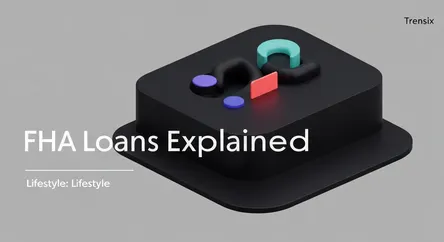Lifestyle
FHA Loans Explained

Discover FHA loans, the government-insured mortgage designed for homebuyers with lower credit scores and smaller down payments. Your path to homeownership.
What is it?
An FHA loan is a mortgage insured by the Federal Housing Administration, a government agency. This insurance protects private lenders, encouraging them to offer loans to buyers who might not qualify for a conventional mortgage. The program is particularly known for its accessible requirements, including a low minimum down payment, often as little as 3.5%, and more flexible credit score qualifications. A key feature is the mandatory Mortgage Insurance Premium (MIP), which is paid both upfront and monthly for the life of the loan in most cases, protecting the lender against default.
Why is it trending?
In a competitive housing market with high prices, FHA loans are trending because they lower the barrier to entry for homeownership. Many prospective buyers, especially first-timers, find it difficult to save the traditional 20% down payment required to avoid private mortgage insurance on conventional loans. The FHA's lenient requirements provide a vital pathway for individuals with moderate income or less-than-perfect credit. As housing affordability remains a significant challenge, these government-backed loans have become an increasingly popular financing tool for aspiring homeowners.
How does it affect people?
FHA loans positively affect people by making the dream of homeownership a reality for a wider demographic. They create opportunities for families and individuals to build equity and financial stability. However, there is a significant trade-off. The required MIP increases the monthly mortgage payment and the overall long-term cost of the loan. Unlike conventional loans where mortgage insurance can be cancelled, FHA MIP often remains for the loan's duration. Borrowers must carefully weigh the immediate benefit of securing a home against the higher lifetime cost associated with this type of financing.